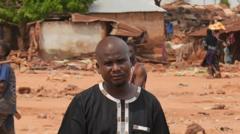As Nigeria grapples with one of the highest fertility rates globally, the comedic drama "Gidan Badamasi" resonates with audiences and prompts discussions about the implications of large families in a rapidly changing society.
Nigeria's "Gidan Badamasi": A Catalyst for Fertility Debate Amid Youth Boom

Nigeria's "Gidan Badamasi": A Catalyst for Fertility Debate Amid Youth Boom
The popular Nigerian show "Gidan Badamasi" has ignited conversations around family size and societal challenges in a country facing a significant youth population increase.
In a modest home in Kano, Nigeria, the Sani family eagerly tunes in to their beloved television series, "Gidan Badamasi." This popular comedy-drama has become more than just entertainment; it mirrors the realities of many Nigerian families, particularly highlighting the consequences of having an excessive number of children. The show's protagonist, known for his numerous marriages and offspring, reflects a larger societal issue: Nigeria's high fertility rate, where women typically have over five children compared to only about 1.5 in wealthier nations.
The narrative posed by "Gidan Badamasi" resonates deeply within the context of Nigeria's soaring youth population, raising essential questions about resource allocation, education, and employment opportunities. With the youngest and fastest-growing population on the globe, Nigeria represents a significant case study in demographic transition. While decreased child mortality rates indicate progress, the increased number of youth presents challenges for societies needing infrastructure and jobs to accommodate them.
Many viewers, like the Sani family, relate to the burdens and realities echoed in the show. Social conversations stirred by the series lead to broader discussions on family planning and the implications of large families in regions where birth rates continue to climb, contrasting sharply with declines observed in wealthier parts of the world. The juxtaposition of comedic portrayal with serious underlying themes signifies a cultural moment, illuminating the intersection of entertainment and societal awareness in shaping public perceptions on family size.
As the dialogue evolves, "Gidan Badamasi" serves as a vehicle for examining both the potential benefits of a younger population and the urgent challenges that accompany it, painting a complex picture of present-day Nigeria. The conversations sparked by the show could pave the way for a deeper understanding of demographic shifts and their socio-economic impacts, aligning with broader trends observed across the African continent.
The narrative posed by "Gidan Badamasi" resonates deeply within the context of Nigeria's soaring youth population, raising essential questions about resource allocation, education, and employment opportunities. With the youngest and fastest-growing population on the globe, Nigeria represents a significant case study in demographic transition. While decreased child mortality rates indicate progress, the increased number of youth presents challenges for societies needing infrastructure and jobs to accommodate them.
Many viewers, like the Sani family, relate to the burdens and realities echoed in the show. Social conversations stirred by the series lead to broader discussions on family planning and the implications of large families in regions where birth rates continue to climb, contrasting sharply with declines observed in wealthier parts of the world. The juxtaposition of comedic portrayal with serious underlying themes signifies a cultural moment, illuminating the intersection of entertainment and societal awareness in shaping public perceptions on family size.
As the dialogue evolves, "Gidan Badamasi" serves as a vehicle for examining both the potential benefits of a younger population and the urgent challenges that accompany it, painting a complex picture of present-day Nigeria. The conversations sparked by the show could pave the way for a deeper understanding of demographic shifts and their socio-economic impacts, aligning with broader trends observed across the African continent.



















